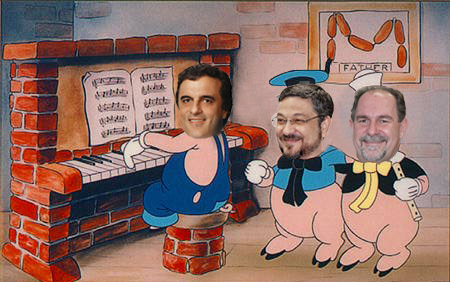
In a few short weeks Dilma Rousseff’s government-to-be has already begun to exhibit the damaging infighting and fractioning that many Brazil-watchers had predicted, raising questions about Ms. Rousseff’s strengths as a leader.
Meirelles’ Sassy Exit
Last week the head of Brazil’s central bank for the past eight years, Henrique Meirelles, criticized the Rousseff government’s aims to place monetary policy in line with the administration’s pro-growth agenda (at the expense of potentially raising inflation), prompting the Rousseff administration part ways with the talented Central Bank president.
News that Meirelles would not be joining the Rousseff administration caused yields on Brazilian bonds to rise, reflecting investor’s fears of a lack of central bank autonomy under Ms. Rousseff. The new administration must now begin a search for a candidate that shares the new administration’s thinking and will be backed by investors. Update: Ms. Rousseff has chosen to fill the position with the current central bank director for financial system regulation and organization, Alexander Tombini.
Although cabinet positions are always expected to change, the Mierelles squabble was unusually public and most likely aimed at injuring Ms. Rousseff during an already sensitive transition period.
The Coalition’s Spoils
The Mierelles episode also comes on the heals of a confrontational request by lower-house legislators from the Brazilian Democratic Movement (PMDB), the largest partner in Dilma Rousseff’s ruling coalition, for more PMDB cabinet posts and a larger say in Brazil’s ministries. While brokering deals with coalition partners is not unusual, the PMDB is infamous for it’s tough bargaining and the Rousseff Presidency won’t be able to count on the Lula administration’s system of monthly cash payouts to assure the party’s ongoing loyalty (See: ‘Mensalão Scandal’)
Foreseeing this hurdle, President Lula will attempt to play cattle driver to the coalition’s legislators and seek to reform Brazilian politics while out of office. Regardless, President Dilma is expected to not only deal with rebellious coalition partners like the PMDB, but to also keep her eye on ambitious factions within her own party (the PT) who hope to play a more prominent role once President Lula leaves office.
Dilma’s Little Piggies
While much of the gossip and scandal would normally be dismissed as noise, Ms. Rousseff’s untested role as a publicly-elected leader makes the recent events particularly worrisome. Add to Merielles’ dismissal and the PMDB’s strong-arming, rumors that Ms. Rousseff is overly dependant on her three closest advisors (legislators José Eduardo Cardozo and Antonio Palocci, and PT party leader José Eduardo Dutra), dubbed her “three little piggies”, and Ms. Rousseff’s eventual mandate already looks worryingly weak.
If Dilma Rousseff is to further President Lula’s legacy and deliver on her promises as a candidate, her power as President must be made felt early on. Ms. Rousseff’s succesful stewardship of Brazil is dependent on her becoming her own person; President Lula’s blessing is no longer enough.